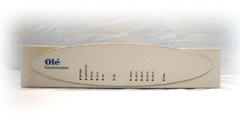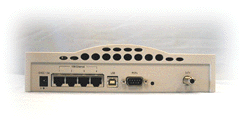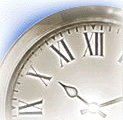 |
| Product
Overview 
More Images





|
Introduction  This
specification defines an external DOCSIS-based HomeGateway product, HomeGater 1000,
for high-speed Internet access applications. The HomeGater 1000 is
designed to operate on two-way cable plants. By additional software enhancements,
it allows this product to work on one-way cable plants inconjunction with a traditional
analog modem as well. The data transmission rate on the cable connection is
asymmetric. The downlink rate, from the cable headend to the modem, is up to 40
megabits per second; the uplink rate, from the cable to the headed, is up to 10 megabits
per second. Additional to the cable connection, this product also provides 4-port
IEEE 802.3 10 base-T Ethernet (10 Mps) Hub and a USB port (12 Mbps) connections. This
specification defines an external DOCSIS-based HomeGateway product, HomeGater 1000,
for high-speed Internet access applications. The HomeGater 1000 is
designed to operate on two-way cable plants. By additional software enhancements,
it allows this product to work on one-way cable plants inconjunction with a traditional
analog modem as well. The data transmission rate on the cable connection is
asymmetric. The downlink rate, from the cable headend to the modem, is up to 40
megabits per second; the uplink rate, from the cable to the headed, is up to 10 megabits
per second. Additional to the cable connection, this product also provides 4-port
IEEE 802.3 10 base-T Ethernet (10 Mps) Hub and a USB port (12 Mbps) connections.
 The
cable modem functions as a bridging internetworking device to transmit and receive data
between the cable interface and either Ethernet or USB interfaces. The following
diagram shows the cable CATV network configuration for the data application. The
cable modem functions as a bridging internetworking device to transmit and receive data
between the cable interface and either Ethernet or USB interfaces. The following
diagram shows the cable CATV network configuration for the data application.

Features
Basic Features
- Function as a bridging internetworking device to provide
data transmission service between the cable and Ethernet/USB interfaces.
- Generic filtering supports on the data link, network
(IP/ICMP/IGMP), and transport (UDP/TCP) layers.
- Simple Network Management Protocol (SNMP) V1, standard MIBs
and OLE Communications proprietary MIB support.
- 56/40 bit DES encryption/decryption support to the data
traffic via the cable interface.
- RSA public/private key algorithm for the DES key exchange.
- DHCP client support via the cable interface.
- Time of Day protocol support for the software upgrade via
the cable interface.
- Traffic shaping and data rate control to the data traffic
over the cable interface.
- Seven LEDs display on the front panel to indicate the cable
modem status.
- Y2K compliant.
Advance Features
The advance features will be implemented in later software
releases.
- Spanning Tree Algorithm Protocol support.
- Function as a routing internetworking device to router data
between the cable and Ethernet/USB interfaces. Router Discovery Protocol will be
supported. Network Address Translation Protocol is an option.
- Quality of Service (QoS) and multiple service ID
(application service flow) support with four upstream queues for delay-sensitive
applications such as voice over IP.
- IGMP proxy support to reduce the upstream broadcast and
multicast data traffic on the cable interface.
- Web-based (HTTP) management supports via both cable and
Ethernet interface.
- SNMP V3 support.
- X.509 Directory Authentication service support for RAS
public key retrieval.
- Work on one-way cable plants in conjunction with an analog
modem.
Connectivity
- Cable interface, ITU J83A Annex A specification
- Upstream: up to 10 megabit per second, 200-3200 KHz per
channel.
- Downstream: up to 40 megabit per second, 6 MHz per channel.
- Ethernet interface with 4 hub ports, 10 megabit per second -
conforms to IEEE 802.3 10BASE-T specification.
- Universal Series Bus 12 megabit per second - conforms to USB
1.0 specification.
Performance
- Total bandwidth of up to 84 Mbps.
- Store-and-forward scheme to forward packets.
- Operates at maximum packet filtering and forwarding rate.
- Provides fram filtering and forwarding functions for each
port, which are capable of filtering and forwarding of all Ethernet packets at a rate of
5000 packets per second.
Flexibility
- Automatic MAC address learning to build the routing
information database.
- Automatic local traffic filtering.
- Transparent to high level protocols.
- Auto-scan various cable downstream frequency plans.
Reliability
- Filtering of erroneous frames (CRC error, fragment, and
jabber).
- Report, log urgent events or issue trouble tickets via
management Protocol.
|
|

|
| Data
Sheet
|
MCNS-DOCSIS Home
Gateway
| |
Downstream
(Receiver) |
Upstream
(Transmitter) |
| Modulation |
64-QAM/256-QAM |
QPSK/16-QAM |
| Symbol
Rate |
5.05694/5.360537 Msps |
0.16, 0.32, 0.64, 1.28, 2.56 Msps |
| Data
Speed |
30.341646 Mbps/64-QAM 42.884296 Mbps/256-QAM |
|
| Center
Frequency |
91 ~ 857 MHz |
5 ~ 42 Mhz |
| Bandwidth |
6 MHz |
200K, 400K, 800K, 1.6M, 3.2MHz |
| Input
Power |
Single Channel: -15dBmV ~ +15dBmV Total: <+30 dBmV |
|
| Output
Power |
8 dBmV ~ +58 dBmV (QPSK) 8 dBmV ~ +55 dBmV (16-QAM) |
|
| MAC
Protocol |
DOCSIS 1.0 & DOCSIS 1.1 |
|
| RF
Interface |
F-Type Female 75 ohm connector |
|
| CPE
Interface |
4-port 10Base-T Ethernet Hub (RJ-45) USB client interface
DB-9 for one-way cable infrastructure |
|
| Protocol |
TCP/IP, UDP, ARP, ICMP, DHCP, TFTP, MD5, BPI |
|
| Bridging |
IEEE 802.1d-compliant Transparent bridging |
|
| Management |
SNMPv2 with MIBII and MCNS DOCSIS 1.0 MIB |
|
| Operating
Temperature |
32 to 104F |
|
| Operating
Humidity |
10% to 90% (non-condensing) |
|
| Storage
Temperature |
14 to 140 F |
|
| Cable
Infrastructure |
Support both two-way and one-way
infrastructure |
|
MCNS-DOCSIS
Internal Cable Modem
| |
Downstream
(Receiver) |
Upstream
(Transmitter) |
| Modulation |
64-QAM/256-QAM |
QPSK/16-QAM |
| Symbol
Rate |
5.05694/5.360537 Msps |
0.16, 0.32, 0.64, 1.28, 2.56 Msps |
| Data
Speed |
30.341646 Mbps/64-QAM 42.884296 Mbps/256-QAM |
|
| Center
Frequency |
91 ~ 857 MHz |
5 ~ 42 Mhz |
| Bandwidth |
6 MHz |
200K, 400K, 800K, 1.6M, 3.2MHz |
| Input
Power |
Single Channel: -15dBmV ~ +15dBmV Total: <+30 dBmV |
|
| Output
Power |
8 dBmV ~ +58 dBmV (QPSK) 8 dBmV ~ +55 dBmV (16-QAM) |
|
| MAC
Protocol |
DOCSIS 1.0 & DOCSIS 1.1 |
|
| RF
Interface |
F-Type Female 75 ohm connector |
|
| CPE
Interface |
PCI 2.1 Bus Interface 10/100 Mbps Ethernet
10 Mbps HomePNA |
|
| Protocol |
TCP/IP, UDP, ARP, ICMP, DHCP, TFTP, MD5, DES,
Triple DES, BPI |
|
| Bridging |
IEEE 802.1d-compliant Transparent bridging |
|
| Management |
SNMPv2 with MIBII and MCNS DOCSIS MIB |
|
| Operating
Temperature |
32 to 104 F |
|
| Operating
Humidity |
10% to 90% (non-condensing) |
|
| Storage
Temperature |
14 to 140F |
|
| Cable
Infrastructure |
Support two-way infrastructure |
|
|
|

|
| Application
Notes |
No Application
Notes currently available. |
|

|
| Y2K 
|
Year 2000 Compliance Y2K Compliance
With the approach of the new millenium, the Year 2000
problem becomes an increasingly important issue for companies which depend on information
systems and related products to conduct their business.
 products can be
part of your Year 2000 solution, not part of the problem. products can be
part of your Year 2000 solution, not part of the problem.  products are certified
as Year 2000 compliant. Our software will accurately address, present, produce, and
calculate data involving dates beginning with January 1, 2000 and will not produce
abnormally ending or incorrect results involving such dates as used in any forward or
regression date based function. Specifics details on products are certified
as Year 2000 compliant. Our software will accurately address, present, produce, and
calculate data involving dates beginning with January 1, 2000 and will not produce
abnormally ending or incorrect results involving such dates as used in any forward or
regression date based function. Specifics details on  Year 2000 compliance are
defined in the Year 2000 compliance are
defined in the  software license agreement. software license agreement.
Product
 wants to assure
its customers of the Year 2000 compliance of its products. The products listed
below, and all versions of their corresponding software are deemed Year 2000 compliant. wants to assure
its customers of the Year 2000 compliance of its products. The products listed
below, and all versions of their corresponding software are deemed Year 2000 compliant.
- HomeGater 1000
- CableGater 1000
|
 |
company | products | sales & support | career | newsroom |
 |
Copyright
© OLÉ Communications, Inc.
1999
Website Design by: SpenceTek, Inc. |



